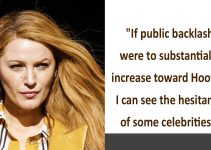



In the ever-evolving landscape of Hollywood, where the lines between personal life and public persona are increasingly blurred, the concept of privacy has become a contentious topic. Recently, actor and filmmaker Justin Baldoni found himself at the center of a heated debate after questioning Blake Lively’s stance on privacy, particularly in light of her decision to publicly address sexual harassment allegations. This incident has sparked a broader conversation about the responsibilities of public figures, the ethics of privacy, and the complexities of navigating sensitive issues in the public eye.
The Context: Blake Lively’s Public Stand
Blake Lively, known for her roles in Gossip Girl and The Age of Adaline, has long been a prominent figure in Hollywood. Over the years, she has used her platform to advocate for various social causes, including gender equality and the #MeToo movement. Recently, Lively made headlines when she publicly discussed sexual harassment allegations, shedding light on the pervasive issue within the entertainment industry. Her candidness was praised by many, as it brought attention to the struggles faced by countless individuals who often remain silent due to fear of retribution.
However, Lively’s call for privacy following her public statements raised eyebrows. In a recent interview, she emphasized the importance of maintaining personal boundaries and protecting her family from the invasive nature of media scrutiny. While her plea for privacy is understandable, it has led to questions about the consistency of her stance, especially given her decision to publicly address such a sensitive and personal issue.
Justin Baldoni’s Perspective
Justin Baldoni, an actor, director, and advocate for gender equality, is no stranger to using his platform to address social issues. Best known for his role in Jane the Virgin, Baldoni has been a vocal supporter of the #MeToo movement and has worked tirelessly to promote healthy masculinity and gender equality. In a recent podcast episode, Baldoni expressed his concerns about Lively’s call for privacy, suggesting that it might be contradictory to her public discussion of sexual harassment allegations.
“On one hand, you have someone who is using their platform to shed light on an incredibly important issue, and that’s commendable,” Baldoni said. “But on the other hand, when you choose to speak out about something as personal and sensitive as sexual harassment, you’re inherently inviting public scrutiny. It’s a delicate balance, and I think it’s important to be mindful of that.”
Baldoni’s comments have sparked a wave of reactions, with some applauding his honesty and others criticizing him for seemingly undermining Lively’s efforts. The debate has opened up a broader discussion about the responsibilities of public figures and the complexities of navigating privacy in the digital age.
The Ethics of Privacy and Public Advocacy
The intersection of privacy and public advocacy is a complex and often murky territory. On one hand, public figures like Blake Lively have a unique opportunity to use their platforms to bring attention to important social issues. Their voices can amplify marginalized perspectives and drive meaningful change. On the other hand, the very nature of their celebrity status means that their personal lives are often subject to intense scrutiny, making it challenging to maintain a sense of privacy.
Lively’s decision to publicly address sexual harassment allegations is a testament to her commitment to the #MeToo movement. By sharing her experiences, she has helped to normalize conversations around sexual harassment and empower others to speak out. However, her subsequent call for privacy has led to questions about the consistency of her stance. Can one truly advocate for a cause as personal and sensitive as sexual harassment without inviting public scrutiny into their own life?
Baldoni’s comments highlight this tension. While he acknowledges the importance of Lively’s advocacy, he also raises valid concerns about the potential contradictions in her approach. “When you choose to speak out about something as personal as sexual harassment, you’re inherently making a choice to open yourself up to public discourse,” Baldoni explained. “It’s not about undermining the importance of the cause, but rather about being mindful of the consequences that come with it.”
The Role of Public Figures in Social Movements
Public figures have long played a crucial role in social movements, using their platforms to bring attention to issues that might otherwise go unnoticed. From civil rights to environmental activism, celebrities have the power to influence public opinion and drive policy changes. However, this influence comes with a unique set of challenges, particularly when it comes to navigating the boundaries between public advocacy and personal privacy.
In the case of Blake Lively, her decision to publicly address sexual harassment allegations is a powerful example of using one’s platform for good. By sharing her experiences, she has helped to break the silence surrounding sexual harassment and create a space for others to come forward. However, her call for privacy following her public statements has led to questions about the responsibilities that come with being a public advocate.
Baldoni’s comments underscore the importance of consistency and mindfulness in public advocacy. “When you choose to speak out about something as personal as sexual harassment, you’re making a choice to be a public advocate for that cause,” he said. “And with that comes a certain level of responsibility. It’s not about shaming or criticizing, but rather about being aware of the impact your words and actions have on others.”
The Broader Implications
The debate surrounding Blake Lively’s stance on privacy and public advocacy has broader implications for the way we think about the role of public figures in social movements. It raises important questions about the ethics of privacy, the responsibilities of celebrity advocates, and the complexities of navigating sensitive issues in the public eye.
One of the key takeaways from this discussion is the importance of consistency in public advocacy. When public figures choose to speak out about personal and sensitive issues, they are inherently inviting public scrutiny into their own lives. While this scrutiny can be uncomfortable, it is also a necessary part of being a public advocate. As Baldoni pointed out, it’s important to be mindful of the consequences that come with using one’s platform to address important social issues.
At the same time, it’s crucial to recognize the challenges that public figures face when it comes to maintaining privacy. The invasive nature of media scrutiny can take a toll on mental health and personal relationships, making it difficult to strike a balance between public advocacy and personal boundaries. As such, it’s important for public figures to have a clear understanding of the potential consequences of their actions and to be prepared for the challenges that come with being a public advocate.
The Way Forward
As the debate surrounding Blake Lively’s stance on privacy and public advocacy continues, it’s clear that there are no easy answers. The intersection of privacy and public advocacy is a complex and often murky territory, requiring a nuanced approach that takes into account the unique challenges faced by public figures.
One potential way forward is for public figures to be more transparent about their intentions and boundaries when it comes to public advocacy. By clearly communicating their goals and limitations, they can help to manage public expectations and reduce the potential for misunderstandings. Additionally, public figures can work to create a support system that allows them to navigate the challenges of public advocacy while maintaining a sense of privacy and personal boundaries.
Ultimately, the debate surrounding Blake Lively’s stance on privacy and public advocacy serves as a reminder of the complexities of navigating sensitive issues in the public eye. It highlights the importance of consistency, mindfulness, and transparency in public advocacy, and underscores the need for a nuanced approach that takes into account the unique challenges faced by public figures.
Conclusion
The conversation sparked by Justin Baldoni’s comments about Blake Lively’s stance on privacy and public advocacy is a timely reminder of the complexities of navigating sensitive issues in the public eye. While Lively’s decision to publicly address sexual harassment allegations is commendable, it has also raised important questions about the responsibilities of public figures and the ethics of privacy.
As the debate continues, it’s clear that there are no easy answers. The intersection of privacy and public advocacy is a complex and often murky territory, requiring a nuanced approach that takes into account the unique challenges faced by public figures. By being mindful of the consequences of their actions and working to create a support system that allows them to navigate these challenges, public figures can continue to use their platforms to drive meaningful change while maintaining a sense of privacy and personal boundaries.
In the end, the debate surrounding Blake Lively’s stance on privacy and public advocacy serves as a reminder of the importance of consistency, mindfulness, and transparency in public advocacy. It underscores the need for a nuanced approach that takes into account the unique challenges faced by public figures, and highlights the potential for meaningful change when public figures use their platforms to address important social issues.



